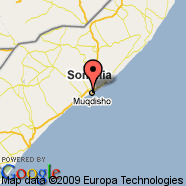 UNITED NATIONS, Oct 27 (Reuters) – Somalia’s embattled government is making slow progress towards restoring security and public services, but the country remains fragile and will need more aid money in the coming months, the United Nations said on Tuesday.
UNITED NATIONS, Oct 27 (Reuters) – Somalia’s embattled government is making slow progress towards restoring security and public services, but the country remains fragile and will need more aid money in the coming months, the United Nations said on Tuesday.
Without significant development aid it would be very hard for the east African nation’s interim government to continue trying to end 18 years of lawlessness and improve the lives of its people, said U.N. political chief Lynn Pascoe.
International donors agreed in April to provide almost $214 million to Somalia and while Pascoe said there were two outstanding pledges that he hoped would be received shortly, more money would be needed.
“I would guess that we would be asking for more money and more assistance in the months ahead. Clearly they are going to need it both for security and also for the social services that the government needs to provide,” Pascoe told reporters.
Fighting between the government and Islamist rebel groups has killed 19,000 civilians since the start of 2007 and driven another 1.7 million from their homes. Diplomats say the lawlessness on land is a major cause of Somali piracy.
Despite foreign naval patrols, attacks on ships by Somali pirates have soared, reaching 148 in the first half of 2009. Thirty-one hijackings were successful, netting tens of millions of dollars for the pirates.
An African Union AMISOM peacekeeping mission in Somalia is slowly being bolstered. It is currently made up of about 5,200 troops and will eventually increase to 8,000, Pascoe said.
“Nobody obviously wants to sound overly optimistic about Somalia at any time, but the fact is that the strategy is in place and it is moving forward,” he said. “You can see the direction that we’re heading and that is somewhat encouraging.”
“Anyone who looks at Somalia would not call the situation anything but fragile,” Pascoe said. “But unlike a few months ago when everyone was making dire predictions … I don’t think people are making those assumptions at the moment.”
U.N. Secretary General Ban ki-Moon’s special envoy on the human rights of internally displaced persons, Walter Kaelin, said on Tuesday that the situation in Somalia was worsening.
Kaelin told reporters he was shocked at the violence internally displaced people suffered in Somalia. He said the humanitarian and protection needs were huge, yet international contributions had declined.
Pascoe said that over half the Somali people alive at the moment were children or youths who had never known peace.
“More than half the population of Somalia is under 18,” said Pascoe. “Anybody in Somalia that is 18 or under has never lived in a country that is not in chaos.”
“It’s so critical that our effort there has to succeed,” he said. “We have to give the people there a real chance.” (Editing by Cynthia Osterman)
____
Source: Reuters






